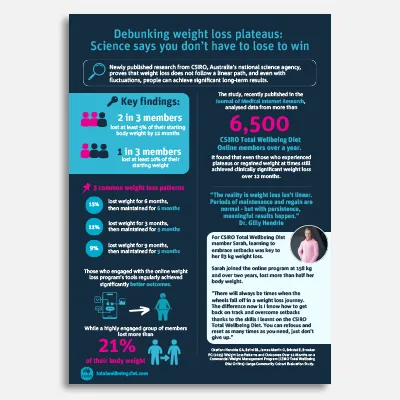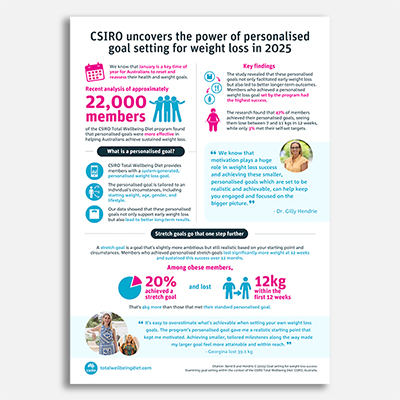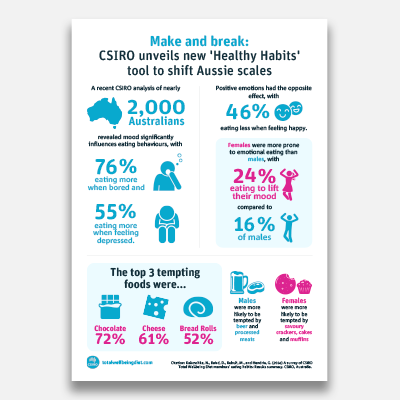A diet backed by science
The CSIRO Total Wellbeing Diet was developed by scientists at the CSIRO and is considered one of CSIRO’s top 10 innovations in its 100-year history, right up there with wifi and Aerogard.
Innovation is in the core of the CSIRO Total Wellbeing Diet and through research into eating habits and lifestyle we strive to always improve our weight management programs. Since we went online in 2014 we have published a number of scientific reports that provide insight into what is proven to be effective when it comes to weight loss.
Our reports
Debunking weight loss plateaus: Science says you don’t have to lose to win
Newly published research from CSIRO, Australia’s national science agency, proves that weight loss does not follow a linear path, and even with fluctuations, people can achieve significant long-term results.
April 2025 - View infographic or View the full published paper

CSIRO uncovers the power of personalised goal setting for weight loss in 2025
CSIRO research finds personalised goals - generated by the Total Wellbeing Diet program and adjusted for factors including starting weight, age, gender, and lifestyle - are key for weight loss success.
January 2025 - View infographic

Make and break: CSIRO unveils new 'Healthy Habits' tool to shift Aussie scales
Australia’s national science agency, CSIRO, has launched a new tool designed to help Australians break free from unhealthy eating habits and make it easier to succeed at weight management.
The free, online Healthy Habits Quiz is based on psychology and behavioural science. It assesses participants’ habit strength, moods and tempting foods, providing tailored, science-backed guidance to make and break habits for a healthier lifestyle.
September 2024 - View infographic or Download the full report

Shaking up weight loss: CSIRO research finds meal replacement shakes offering stacks up
New analysis has found CSIRO's Fast Start meal replacement offering, delivered as part of the CSIRO Total Wellbeing Diet online program, has helped Australians kick start their weight loss journey, with 98% of members losing weight in 12 weeks.
The analysis of over 10,300 CSIRO Total Wellbeing Diet members using Fast Start showed 28% of people shifted out of the obese category after 12 weeks, and 31% did so after 24 weeks.
June 2024 - View infographic or Download the full report

A decade of success: How CSIRO’s Total Wellbeing Diet measures up
Australia’s national science agency, CSIRO, is celebrating a decade of reducing the population’s waistline through its scientifically backed program, the CSIRO Total Wellbeing Diet online.
New analysis from CSIRO, which tracked the weight loss of members over the 10 years since the launch of the online program, found that 97 per cent of members who completed the program lost weight in just 12 weeks. In total, members of the CSIRO Total Wellbeing Diet online have lost a combined 558,000 kilograms - the equivalent weight of about 46 double decker buses.
Over 1.2 million Australians have been impacted by the CSIRO Total Wellbeing Diet throughout its evolution from the original book to the sophisticated digital platform it is today.
January 2024 - View infographic

Aussie Diet Downfall
The latest findings from the CSIRO Healthy Diet Score reveals that many Australians are falling short in making nutritious choices for their health and wellbeing.
Over the past eight years, the average CSIRO Diet Score has hovered around 55/100. However, a closer look at the year-on-year data shows a slight decline from 56 in 2015 to 53 in 2023. Of particular concern is the consumption of discretionary foods, which has surged to approximately 28 servings per week on average. This represents a significant increase of 10 servings per week since 2015.
September 2023 - View infographic or Download the full report

Long Term Weight Loss
CSIRO recently analysed the long-term weight loss results of CSIRO Total Wellbeing Diet members. The data showed that on average members who complete the 12 Week Program lose 7.2% after 12 weeks, 9% after 6 months and then maintain their weight loss for the remainder of the year. “Super star” members (those who engaged with the tools and features the most) continued to lose weight for a full year, with an average total weight loss of 22.3kg or 21.7% after 1 year.
April 2023 - View infographic or Download the full report

New Fast Start Program curbs cravings and boosts weight loss
CSIRO Total Wellbeing Diet has launched a new diet plan that will help Australians start healthy weight loss in 2023 by tackling one of the biggest obstacles to successful dieting: cravings.
January 2023 - View infographic or Download the full report

Mind over matter? Not when it comes to weight loss
A new CSIRO study of 11,000 CSIRO Total Wellbeing Diet members found the strongest predictor of weight loss was engagement with the right digital support tools, rather than being in the right mindset, when starting a diet.
September 2022 - View infographic or Download the full report

Do financial rewards lead to greater weight loss? A secondary analysis
An analysis of over 48,000 CSIRO Total Wellbeing Diet members that sheds light on how the refund incentive affects weight loss outcomes.
March 2022 - View infographic or Download the full report

CSIRO brings new "Hope" to weight loss
Hope is an AI weight loss coach developed to help members of the CSIRO Total Wellbeing Diet lose more weight. The innovation is shaped by over 100 million data points from the CSIRO Total Wellbeing Diet digital platform.
January 2022 - View infographic or Download the full report

Study reveals why personality matters for weight loss
CSIRO studied over 245,000 people to understand the unique behavioural and emotional characteristics that can impact weight loss.
August 2021 - View infographic

Journal of Medical Internet Research: Weight loss and usage of an online commercial weight loss program
This comprehensive evaluation published in Journal of Medical Internet Research showed the CSIRO Total Wellbeing Diet is effective for weight loss, particularly for members who finished the program and were active in using the platform and tools provided.
June 2021 - View on Journal of Medical Internet Research or Download the full report

Scientists combat Australia's #1 diet issue: junk food
Our research finds that junk food makes up a large portion of the Aussie diet.
April 2021 - View infographic

Start Strong for greater success
New research from CSIRO reveals the characteristics associated with greater weight loss success.
September 2020 - View infographic or Download the full report

How to achieve Total Wellbeing
New research from CSIRO reveals how to achieve the balance of both physical and psychological wellbeing.
May 2020 - View infographic

CSIRO Total Wellbeing Diet 5 Year Report
One of the world’s largest weight loss studies reveals the key to three times more weight loss.
January 2020

Research reveals health is #1 for weight loss
New research from CSIRO shows health conditions top the reasons for losing weight in an analysis of 65,000 dieters. A follow-up survey of 3000 members suggests weight loss is the best medicine for a range of chronic health conditions.
August 2019 - View infographic or Download the full report

Gut health and weight loss
An overview of the scientific evidence of dietary fibre for weight loss.
January 2019 - Download the report

Do financial incentives improve weight loss?
Analysis of over 13,000 members of the CSIRO Total Wellbeing Diet suggests ‘yes’.
Members who received a refund lost 6.2 percent of their starting body weight compared to 4 percent for non-refunded members. Refunded members lost 54 percent more weight than non-refunded members.
August 2018 - Download the report or view infographic

VegEze Impact Report
How a mobile app is boosting vegetable intake in those that need it most.
June 2018 - Download the report


CSIRO Diet Types
An exploration of the personality traits of over 90,000 Australians
September 2017 - Download the report

TWD Online Program 1 Completer's Weight Loss
A scientific study of 5,594 members who have completed Program 1 of the CSIRO Total Wellbeing Diet.
June 2017 - Download the report

Fruit, Vegetables and Diet Score
A deep dive into the self-reported fruit, vegetable and juice consumption of 145,000 Australian adults. With Horticulture Innovation Australia.
April 2017 - Download the report

CSIRO Healthy Diet Score 2016
Australia's largest ever diet survey confirms we're not as healthy as we think we are.
September 2016 - Download the report

CSIRO Total Wellbeing Diet scientific publications list
The diet has been extensively researched with results published in medical and nutrition journals internationally. See the list of publications below.
- Bowen J, Noakes M, Clifton PM. 2006. Appetite regulatory hormone responses to various dietary proteins differ by BMI status despite similar reductions in ad libitum energy intake. J Clin Endocrinol Metab. 91(8):2913-9
- Bowen J, Noakes M, Clifton PM. 2005. Effect of calcium and dairy foods in high protein, energy-restricted diets on weight loss and metabolic parameters in overweight adults. Int J Obes Relat Metab Disord. 29(8):957-65.
- Bowen J, Noakes M, Clifton P. 2005. Effects of dietary protein type on energy intake and appetite regulatory hormones. Asia Pac J Clin Nutr. 14. Suppl: S66.
- Bowen J, Noakes M, Trenerry C, Clifton PM. 2006. Energy intake, ghrelin, and cholecystokinin after different carbohydrate and protein preloads in overweight men. J Clin Endocrinol Metab. Apr. 91(4): 1477-1483. Jan 24.
- Brindal E, Freyne J, Saunders I, Berkovsky S, Smith G, Noakes M. Features predicting weight loss in overweight or obese participants in a web-based intervention: randomized trial. J Med Internet Res. 2012;14(6):e173.
- Brinkworth GD, Noakes M, Parker B, Foster P, Clifton PM. 2004. Long-term effects of advice to consume a high-protein, low-fat diet, rather than a conventional weight-loss diet, in obese adults with Type 2 diabetes: one-year follow-up of a randomised trial. Diabetologia. Oct. 47(10): 1677-1686.
- Clifton PM, Keogh JB, Foster PR, Noakes M. 2005. Effect of weight loss on inflammatory and endothelial markers and FMD using two low-fat diets. Int J Obes (Lond). Dec. 29(12): 1445-1451.
- Farnsworth E, Luscombe ND, Noakes M, Wittert G, Argyiou E, Clifton PM. 2003. Effect of a high-protein, energy-restricted diet on body composition, glycemic control, and lipid concentrations in overweight and obese hyperinsulinemic men and women. Am J Clin Nutr. Jul. 78(1): 31-39.
- Keogh JB, Grieger JA, Noakes M, Clifton PM. 2005. Flow-Mediated Dilatation Is Impaired by a High-Saturated Fat Diet but Not by a High-Carbohydrate Diet. Arterioscler Thromb Vasc Biol. 25(6):1274-9
- Luscombe-Marsh ND, Noakes M, Wittert GA, Keogh JB, Foster P, Clifton PM. 2005. Carbohydrate-restricted diets either high in monounsaturated fat or high in protein are equally effective at promoting fat loss and improving blood lipids. AJCN. Apr. 81(4): 762-772.
- Moran LJ, Brinkworth G, Noakes M, Norman RJ. 2006. Effects of lifestyle modification in polycystic ovarian syndrome. Reprod Biomed Online. May. 12(5): 569-578. Review.
- Moran LJ, Luscombe-Marsh N, Noakes M, Wittert GA, Keogh JB, Clifton PM.2005. The satiating effect of dietary protein is unrelated to post-prandial ghrelin secretion. Asia Pac J Clin Nutr. 14. Suppl: S64.
- Moran LJ, Luscombe-Marsh ND, Noakes M, Wittert GA, Keogh JB, Clifton PM. 2005. The satiating effect of dietary protein is unrelated to post-prandial ghrelin secretion. J Clin Endocrinol Metab. 90(9):5205-11.
- Moran LJ, Noakes M, Clifton PM, Wittert GA, Williams G, Norman RJ. 2006. Short-term meal replacements followed by dietary macronutrient restriction enhance weight loss in polycystic ovary syndrome. Am J Clin Nutr. Jul. 84(1): 77-87
- Moran LJ, Noakes M, Wittert GA, Clifton PM, Norman RJ. Weight loss and vascular inflammatory markers in overweight women with and without polycystic ovary syndrome. Reprod Biomed Online. 2012;25(5):500-3.
- Moran LJ, Noakes M, Clifton PM, Wittert GA, Williams G, Norman RJ. 2005. Effective weight loss and maintenance strategies in polycystic ovary syndrome. Asia Pac J Clin Nutr. 14. Suppl: S94.
- Noakes M, Clifton PM. 2004. Weight loss, diet composition and cardiovascular risk. Current Opinion in Lipidology. 15: 31-35.
- Noakes M, Bowen J, Clifton P. 2005. Dairy foods or fractions for appetite and weight control. Aust J Dairy Tech. July . Pp.152-153.
- Noakes M, Lau CW, Bowen J, Clifton PM. 2005. The effect of a low glycaemic index (GI) ingredient substituted for a high GI ingredient in two complete meals on blood glucose and insulin levels, satiety and energy intake in healthy lean women. Asia Pac J Clin Nutr. 14. Suppl: S45.
- Noakes M, Foster PR, Keogh JB, Clifton PM. 2005. Post prandial glucose and insulin responses to test meals and insulin sensitivity after weight loss on a very low carbohydrate diet compared to low fat high carbohydrate diets. Asia Pac J Clin Nutr. 14. Suppl: S112.
- Noakes M, Foster PR, Keogh JB, James AP, Mamo JC, Clifton PM. 2006. Comparison of isocaloric very low carbohydrate/high saturated fat and high carbohydrate/low saturated fat diets on body composition and cardiovascular risk. Nutr Metab (Lond). Jan. 11:3(1): 7.
- Noakes M, Keogh JB, Foster PR, Clifton PM. 2005. Effect of an energy-restricted, high-protein, low-fat diet relative to a conventional high-carbohydrate, low-fat diet on weight loss, body composition, nutritional status, and markers of cardiovascular health in obese women. Am. J. Clin. Nutr. Jun. 81(6): 1298-1306.
- Noakes M, Williams G, Keogh JB, Clifton P. 2005. Influence of high protein snack foods on satiety, food intake and glucose and insulin response: a single blind cross over study. Asia Pac J Clin Nutr. 14. Suppl: S113.
- Parker B, Noakes M, Luscombe N, Clifton P. 2002. Effect of a high-protein, high-monounsaturated fat weight loss diet on glycemic control and lipid levels in type 2 diabetes. Diabetes Care. Mar. 25(3): 425-430.
- Pearce KL, Clifton PM, Noakes M. Egg consumption as part of an energy-restricted high-protein diet improves blood lipid and blood glucose profiles in individuals with type 2 diabetes. Br J Nutr. 2011;105(4):584-92.
- Shrapnel B, Noakes M. Discriminating between carbohydrate-rich foods: A model based on nutrient density and glycaemic index. Nutr Diet. 2012;69(2):152-8.
- Sjoberg N, Brinkworth GD, Wycherley TP, Noakes M, Saint DA. Moderate weight loss improves heart rate variability in overweight and obese adults with type 2 diabetes. J Appl Physiol. 2011;110:1060-4.
- Stuart KL, Wyld B, Bastiaans K, Stocks N, Brinkworth G, Mohr P, et al. A telephone supported cardiovascular lifestyle program (CLIP) for lipid reduction and weight loss in General Practice patients: A randomised controlled pilot trial. Public Health Nutr. 2012;In Press.
- Taylor PJ, Kolt GS, Vandelanotte C, Caperchione CM, Mummery KW, George ES, et al. A review of the nature and effectiveness of nutrition interventions in adult males – a guide for intervention strategies. Int J Behav Nutr Phys Activity. 2013:10-13.
- Tey SL, Brown RC, Gray AR, Chisholm AW, Delahunty CM. Long-term consumption of high energy-dense snack foods on sensory-specific satiety and intake. Am J Clin Nutr. 2012;95(5):1038-47.
- Thomson RL, Brinkworth GD, Noakes M, Clifton PM, Norman RJ, Buckley JD. The effect of diet and exercise on markers of endothelial function in overweight and obese women with polycystic ovary syndrome. Human Reproduction. 2012;27(7):2169-76.
- Wycherley T, Brinkworth G, Clifton PM, al e. A one year high protein, low fat weight loss diet improves body composition and cardiometabolic risk factors in overweight males Faseb J. 2012;26.
- Wycherley TP, Brinkworth GD, Clifton PM, Noakes M. Comparison of the effects of 52 weeks weight loss with either a high protein or high carbohydrate diet on body composition and cardiometabolic risk factors in overweight and obese males. Nutrition and Diabetes. 2012;2:e40.
- Wycherley TP, Buckley JD, Noakes M, Clifton PM, Brinkworth GD. Comparison of the effects of weight loss from a high protein vs. standard protein energy restricted diet on strength and aerobic capacity in overweight and obese males. Eur J Nutr. 2012;52(1):317-25.
- Wycherley TP, Mohr P, Noakes M, Clifton PM, Brinkworth GD. Self-reported facilitators of and impediments to maintenance of healthy lifestyle behaviours following a supervised research based lifestyle intervention program in patients with type 2 diabetes. Diabetic Medicine. 2012;29(5):632-9.
- Wycherley TP, Moran LJ, Clifton PM, Noakes M, Brinkworth GD. Effects of energy restricted high protein, low fat vs. standard protein, low fat diets: A meta-analysis of randomised controlled trials. Am J Clin Nutr. 2012;96(6):1281-98.